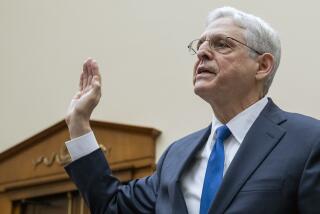Nation Owes Bork a ‘Substantial Debt,’ Richardson Asserts
- Share via
WASHINGTON — Former Atty. Gen. Elliot L. Richardson said today the nation “owes a substantial debt” to Supreme Court nominee Robert H. Bork for the way Bork handled the firing of Watergate special prosecutor Archibald Cox in 1973.
Richardson, who quit rather than fire Cox, told the Senate Judiciary Committee that “from the very moment” Bork took over as acting attorney general, Bork began moving toward appointment of a new prosecutor.
Richardson said he and his deputy, William D. Ruckelshaus, quit because they had made commitments to the judiciary panel not to fire Cox. But Bork, Richardson said, had no such commitment and was right to carry out President Richard M. Nixon’s orders to dismiss Cox in the “Saturday Night Massacre.”
Meanwhile today, in his most stinging attack on Bork since confirmation hearings began, committee Chairman Joseph R. Biden Jr. said he has no doubt that the Supreme Court nominee would “come down for government intrusion” in Americans’ private lives.
Right of Privacy Issue
Biden (D-Del.), who has refrained until now from making anti-Bork statements while conducting the hearings, said Bork’s failure to recognize a constitutional right of privacy troubles him more than any other aspect of the nomination.
Richardson, who had previously announced his support for Bork, said in reference to the Watergate period, “I think the nation owes a substantial debt to Robert Bork in that situation.”
Asked by Sen. Edward M. Kennedy (D-Mass.) whether Bork--who was then solicitor general--should have resigned rather than fire Cox, Richardson replied: “That’s a silly suggestion. Why would the best possible man to be acting attorney general quit after carrying out the most distasteful part of the job?”
Kennedy, however, said it “goes beyond the imagination” to think that Richardson’s commitment with the Judiciary Committee not to fire Cox was a personal contract that did not affect Bork. The senator said Bork could have resigned.
Richardson said in his opening statement that “a refusal by Robert Bork to carry out the President’s order . . . would not have thwarted the President’s decision.”
Biden attacked the nominee’s position after three law professors said Bork probably would not change his position that the Supreme Court used faulty reasoning when it struck down state laws as intruding on rights of privacy.
With the public hearings nearing an end, Senate Majority Leader Robert C. Byrd (D-W.Va.) said Monday that he had suggested to Biden that the committee send the Bork nomination to the Senate floor without recommendation.
Presidential nominations generally are brought to the Senate floor only after approval by a Senate committee. But Byrd, a member of the judiciary panel, said, “I personally don’t want to vote negatively or positively on this nomination until after it is sent to the Senate floor.”
AIDS Crisis Cited
Biden, speaking on the right of privacy, told the committee today: “God only knows what will happen to this country if the AIDS crisis reaches the proportions” predicted by some in the medical community. “What will happen to our right of privacy? Where will Judge Bork come down?
“I am left without any doubt he must come down for government intrusion and against expansion of individual rights.”
“His hostility to the right of privacy has been greater than that of any recent justice--moderate, liberal or conservative,” Harvard professor Kathleen Sullivan told the panel. She noted that even in his recent committee testimony, Bork still said he found no constitutional basis for a general right of privacy.
New York University law professor David Richards termed Bork’s views on constitutional privacy “extreme and quite undefended against a great weight of contrary argument and authority.”
Reagan to push for Bork, Page 5.
More to Read
Sign up for Essential California
The most important California stories and recommendations in your inbox every morning.
You may occasionally receive promotional content from the Los Angeles Times.













